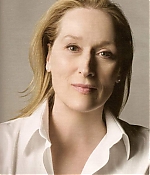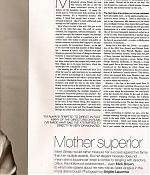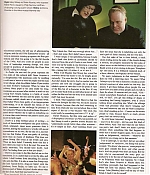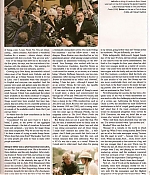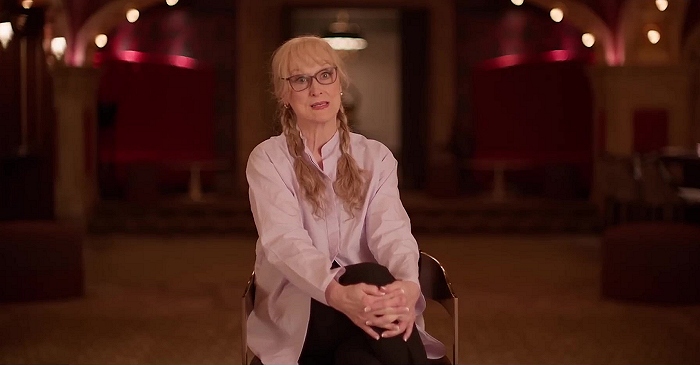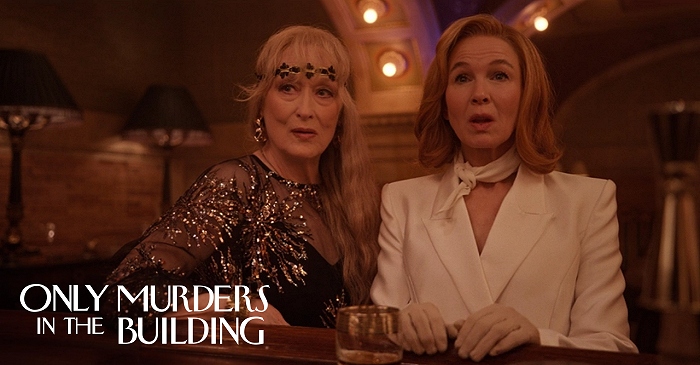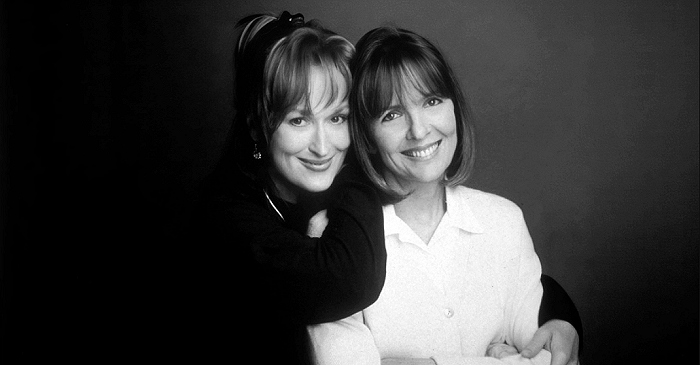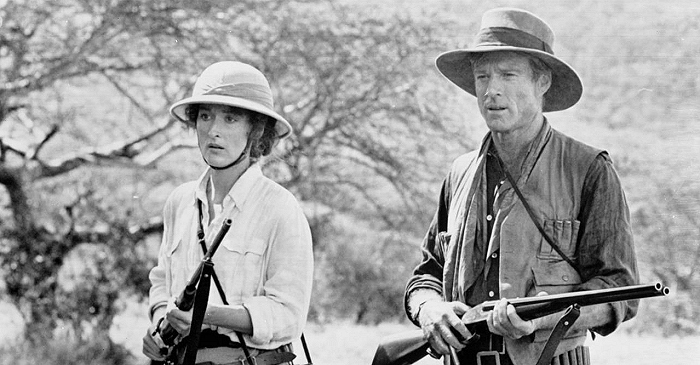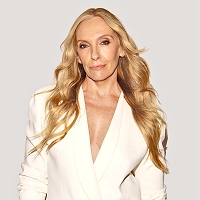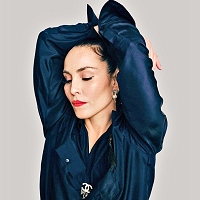|
Simply Streep is your premiere online resource on Meryl Streep's work on film, television and in the theatre - a career that has won her acclaim to be one of the world's greatest living actresses. Created in 1999, Simply Streep has built an extensive collection over the past 25 years to discover Miss Streep's body of work through thousands of photographs, articles and video clips. Enjoy your stay and check back soon.
|
|
Mother Superior
The Telgraph ·
December 06, 2008
· Written by Mick Brown
| ||
|
Tags
|

Meryl Streep has cultivated a characteristically elegant way of dissembling whenever the subject of greatness occurs. Streep has won two Oscars, but she is also the most nominated actress in the history of the Academy Awards – 14 times. Or, as she puts it, ‘I’ve lost more than anybody in the acting division. It’s a wonderful honour.’ She smiles. ‘I think that people have a sense – and certainly I share it – that I’ve been celebrated quite enough and let’s spread it around.’ How often it is that a film star’s life gets in the way of the roles they play. The stuff of gossip columns, fan magazines, tabloid newspapers – the marital bust-ups, the cosmetic surgery, the perfume contracts – comes together to constitute a sort of critical mass that makes it almost impossible to believe whatever character they happen to be playing on screen. By comparison, Streep – at the age of 60, and with nearly that number of films behind her – remains a tabula rasa. Marital bust-ups? Streep has enjoyed that rarest of things in the movie business: a long and happy marriage, to the sculptor Don Gummer. She remains a sublime mystery, her head rising above the parapet only when a new film obliges her to do press interviews, which she discharges with a minimum of fuss. Our meeting got off to an awkward start. It is often the case for such interviews to be conducted in the neutral surroundings of a hotel suite. And I was duly instructed by her office to present myself at a swanky Manhattan hotel, collect the key from reception and make my way to the suite, where Streep would arrive at the allotted time. The ‘suite’ turned out to be not a suite at all, but a bedroom. I was contemplating the multiple breaches of established Hollywood protocol this entailed – the world’s most famous actress being thrown to a total stranger in a hotel room – when there was a knock at the door. It was Meryl Streep. She stepped in, taking in the room with one glance – the small sofa and chair, the very large bed. The thought flashed through my mind that somebody would be paying for this infraction later. ‘Nice room!’ Streep said brightly without missing a beat, and, artfully defusing the awkwardness of the situation with a joke, asked, ‘Should we do this on the bed?’ She was dressed in a raincoat, a black sweater, trousers and boots. She settled herself on the sofa. The first thing that strikes you is how unfussed, how personable, how – in the nicest possible way – ordinary Meryl Streep is. There is absolutely no side to her whatsoever. Her manner is of the rather nice, intelligent woman who chairs the local Parent Teacher Association – or perhaps the well-groomed headmistress of a rather expensive public school. One of her most frequently employed verbal tics is a tone of jokey faux-exasperation, a mother struggling to keep her equanimity and good humour in the face of an errant child – or critic, or Hollywood executive, or producer…
Streep has a new film out, Doubt – an adaptation of the 2004 Tony Award- and Pulitzer Prize-winning play by John Patrick Shanley, which Shanley has directed himself. Streep plays the part of Sister Aloysius, the Mother Superior of a convent school who suspects a priest, Father Flynn (Philip Seymour Hoffman), of abusing a young black pupil. Set in the inner-city New York neighbourhood of the Bronx in 1964, Doubt was inspired by Shanley’s memories of his own schooldays at St Anthony’s Catholic school. (The school, which has changed little since Shanley’s day, was actually used for exteriors in the film. Permission to shoot inside was refused.) Shanley – who has to his name more than 20 plays, and film scripts including Moonstruck and Joe and the Volcano – says he had long wanted to write a play about his schooldays, but was finally given the impetus for Doubt by the rash of child-abuse scandals sweeping through the Catholic Church, ‘although the scandals in themselves were not that interesting to me. The fact that clergy were abusing was well known – but what is the moral and thematic stand in that? Is it wrong? Yes. That’s a no-brainer.’ More interesting to explore, he says, were the changes sweeping through the social and religious order in the early 1960s – the time of the Second Vatican Council – which were being felt even in the parochial backwater of the Bronx. ‘You could feel it just outside; the tectonic plates of the old educational system, the old way of administering religion, and the old 1950s Eisenhower society – all were in recession, coming up against the Beat generation and what was going to be the full throttle of the 1960s. And you could see people in positions of leadership resisting change, and other people in positions of leadership, like Pope John XXIII, calling for change.’ In Doubt, the nun and the priest represent the two poles of this cultural shift. Sister Aloysius is a disciplinarian who maintains order by instilling a cold vein of terror in both the pupils and the nuns in her charge, while the affable Father Flynn exudes an elder brother’s bonhomie. When he takes the solitary black pupil in his class under his wing, suspicions are aroused after alcohol is smelt on the young boy’s breath, leading to a battle of words and wills between the nun and the priest. As these exchanges unfold, doubt sets in on myriad levels. Has Father Flynn been guilty of an inappropriate relationship, or is he himself the victim of the nun’s resentment at the challenge he presents to her authority? There is the doubt in Sister Aloysius’s mind about whether she is right in embarking on a course that could destroy the priest’s career; and doubt in faith itself. Doubt is a truly brilliant piece of writing – a work of formidable intelligence and great subtlety, which ultimately raises more questions than it answers, leaving the audience to wrestle with moral conundrums on its own. By the end of it, my feeling was that Father Flynn was guilty of nothing more than an excess of kindness. This does not please Streep. She looks at me evenly and says, ‘Then we have failed. I honestly think that this is not where you want to be at the end. You must be really uncertain. You should have doubt. And what I’m feeling from you is that you didn’t.’
There is one scene in the film that led me to that conclusion. It is a scene that is not in the play, and which I shall forbear from describing for anyone who sees the film. It is also a scene that Streep says she had ‘knock-down, drag-out fights’ with the producer, Scott Rudin, to have cut. ‘To me it destroys part of Sister Aloysius’s doubt about what she has done. And that was hard for me.’ How ferociously did she argue the point? ‘Well, short of saying I wouldn’t do any interviews…’ Streep arches her eyebrow meaningfully. ‘And I almost went there. That, by the way, is the only thing they pay attention to. Me screaming, “But I think this, I feel very strongly about that…” – that’s just noise. But I didn’t have a prayer. ‘I wasn’t angry. I was speechless, because I really don’t think that doubt in increments should be removed from this at all. Doubt is our friend. And once you tip the scales in one direction or another it’s very, very dangerous. The thing is calibrated like a tuning fork: it’s either A, or it’s not A.’ When I tell Shanley that Streep has voiced her concerns about the scene to me, he laughs good-naturedly: ‘I’m sure she did. But she is an actor. And she’s inside the story. And no matter how she protests and how she struggles she is going to inhabit a point of view that is not the point of view of the film but of a character in the film. It’s my job to stand back from an individual point of view within the film and see the story as an animal unto itself that must be served. ‘I think what happened with Meryl is that the better she thought the film was, the more anxious she became, because then she had something to lose. Even when she was worried about this or that aspect of the cut it was because “My God, this could really be something and don’t f*** it up”.’ David Thomson, the film critic and author of A Biographical Dictionary of Film, has pointed out that Streep is such a peerless actress because she ‘understands people better than other actresses – it’s as simple as that’. And watching Doubt you have the sense that she is inhabiting not only the nun’s garb of Sister Aloysius, but her very skin.
Our first sight of her is from behind, a black cloak striding down the aisle of the church during a sermon, her progress measured by the looks of abject terror on the children’s faces as she passes, to finally arrive at a boy dozing in his pew. ‘Straighten up!’ she hisses. It is a brilliantly rendered study of a fierce, didactic, ideologically driven woman. ‘So many judgements in that sentence!’ Streep fixes me with a reproving stare. ‘So many! What I always try to do with a character is make an architectural construct of what made her this way.’ She pauses. ‘I get these feelings about people. Do you know how you meet certain people and you talk to them for about 10 minutes and you think, “Ooh – cancer somewhere. Somebody is really sick, or was sick, or died”, you get this feeling of illness or something bad having happened, even if you’re talking about something else. What’s the offstage event that preceded what they’re bringing me? You read behaviour and you see what’s compensatory, what’s making up for… Comics are the easiest people to read, because there’s so much private pain; that’s an obvious thing. ‘So with Sister Aloysius I thought that probably – and it’s in the script – she has seen this kind of abuse before. And I feel that what she saw before was pretty bad. And I think you make a private decision when something like that happens to make sure it doesn’t happen again. So to you that reads as judgemental, vindictive – whatever the adjectives you strung out in that sentence.’ I try to interrupt, to say that I did not say either ‘judgemental’ or ‘vindictive’, but Streep will not be stopped. ‘You know,’ she goes on, ‘some people see scary guys outside the door, and other people don’t. And the people who don’t are lucky. But the ones who’ve encountered the scary guys are marked by it for the rest of their lives, and it’s hard to be Pollyanna when that happens. So I think that’s who Sister Aloysius is. Maybe there was something personally that had happened to her where her faith was shaken. Who knows?’ She shrugs. ‘John [Shanley] didn’t tell me any of these things. I made it up for myself.’ It is a role where Streep, stripped of any make-up, her lined face framed with startling severity in the nun’s black bonnet, looks not only her age, but older. ‘I think for Sister Aloysius beauty is as beauty does. But that’s part of the gorgeous thing of being a nun. A nun. None. No. You are renunciating… these concerns. And there’s a wonderful freedom for a woman – always, always, always concerned with how you look. You are your acts.’
One of the things that drew her to the script in the first place, she says, was the non-believer’s fascination with the religious life – ‘the yearning for the ineffable, for real true certainty, answers’. Growing up in New Jersey, she attended a school where most of her friends were Catholic, and she would often go to Mass ‘because I loved it. It was in Latin. And I remember when they changed it to English and everyone was appalled. And the parents were upset and guitars came into the service and they didn’t swing the censer any more.’ She pauses. ‘So I’ve always been really, deeply interested, because I think I can understand the solace that’s available in the whole construct of religion. But I really don’t believe in the power of prayer, or things would have been avoided that have happened, that are awful. So it’s a horrible position as an intelligent, emotional, yearning human being to sit outside of the available comfort there. But I just can’t go there.’ So where does she draw consolation in the face of ageing and death? ‘Consolation? I’m not sure I have it. I have a belief, I guess, in the power of the aggregate human attempt – the best of ourselves. In love and hope and optimism – you know, the magic things that seem inexplicable. Why we are the way we are. I do have a sense of trying to make things better. Where does that come from?’ She laughs. ‘And why do some people just seem to want to make other people miserable?’ Streep’s father was a pharmaceutical executive, her mother a commercial artist. She is the eldest of three children, and the only daughter. After studying drama at Vassar and Yale, and acting on stage and in television, she made an acclaimed film debut in 1977, at the relatively late age of 28, in a supporting role in Julia, Fred Zinnemann’s film about the novelist Lillian Hellman. In 1979 she was nominated for Best Supporting Actress at the Academy Awards for her role in The Deerhunter, and a year later she won the first of her two Best Actress Oscars for Kramer vs Kramer. (She won the second in 1983, for Sophie’s Choice.)
Streep has a way of dividing opinion. It has become a favourite critical saw to describe her as a technically immaculate actress who lacks feeling; but audiences – and her fellow actors – tend to disagree. Diane Keaton once described her as ‘my generation’s genius’, while among younger actresses she inspires an admiration bordering on the awe-struck. Vera Farmiga, who worked with her on The Manchurian Candidate, describes Streep as ‘untouchable. I try to take all my cues from her as a role model for women, as an actress, as a human being.’ (Dustin Hoffman, famously, was less complimentary. After starring with Streep in Kramer vs Kramer he described her as ‘selfish’ and ‘obsessed’, stating, ‘I hate her guts – although I respect her as an actress.’ Streep, for her part, has equably described Hoffman as an ‘old buddy’.) If one were to draw a graph of Streep’s career it would show a sharp and uninterrupted rise through the 1970s and 1980s (the two Oscars, and The French Lieutenant’s Woman and Out of Africa); then a slump in the 1990s (mediocrities such as She-Devil and Death Becomes Her and not a single film between 1999 and 2002); and a strong resurgence over the past few years, culminating in her role two years ago as Miranda Priestly, the icy magazine editor in The Devil Wears Prada (we shall pass over Mamma Mia! for the time being). But Streep does not see it quite like that. Her life, she says, is measured more by family than by work. ‘I can only remember where I am and what I was doing post-partum and all those things. I really don’t measure my career like… a ball-player. And I think you would find that’s true of a lot of women, actresses. Just like men and women measure their lives differently. Was this a 10? Or was this a nine, or a seven? Where do I stand next to other men? And when I’m pissing is my stream going further than his?’ Streep arches her eyebrows. ‘We pee differently, you know.’ While indisputably Hollywood’s biggest female star of the past 30 years, she has always appeared at one remove from the movie establishment. She lived in Los Angeles for four years when her children were younger, purely as a matter of convenience – she could work and still be home in time to have supper with the family and put the children to bed. Her husband, a sculptor, liked the lively arts community and the fact that he could work outside for nine months of the year. But Streep says she was never comfortable there, and was pleased to move back to the East Coast to be nearer her ageing parents. (She now has a home in Connecticut and an apartment in New York.) Notwithstanding her success, she has been a frequent critic of the way in which mainstream cinema tends to offer few challenging roles for actresses of a certain age. Addressing the Screen Actors Guild in 1990, she described the male Hollywood establishment as full of ‘stupid, greedy people’, and half joked that if the trend continued women would be eliminated altogether from movies by 2010. Executives, she went on, didn’t like to cast women who ‘remind them of their first wives’.
‘Well, I still think that’s absolutely true,’ she tells me. ‘I’m always shocked when I get another job.’ Shocked? How can that be so? ‘Because it’s a miracle, in the world in which I grew up. When I was a young actress, Bette Davis put an ad in the trade newspaper saying “Actress, late 40s, eager to work” – because there was no work. When she made Hush… Hush, Sweet Charlotte she was portrayed in that movie as a hag, and she was younger than I am now.’ Davis was 56. ‘When she did All About Eve she was 42 – 18 years younger than I am, and playing an out-of-work, washed-up actress, and the audience concurred with that portrayal of her – because clearly it was over. That’s the expectation I had growing up.’ But that was then. Surely times have changed. ‘Sort of… but if I look at the landscape of roles available, times have changed, mostly for me. I mean, I get a lot of the work; it’s not spread around very well. It’s the economics; and the blighted imagination of the people who finance films: “Well, Meryl made The Devil Wears Prada so she’ll make money in the next one.” But only she…’
Streep has turned producer herself just once in her career: in 1997, in the made-for-television film First Do No Harm, in which she also starred. When I ask if she has ever been tempted to direct, she laughs. ‘I’m always tempted to direct. In fact many of the directors on films I’ve made have said I’ve attempted to direct! I’m very opinionated.’ So you give directors a hard time? ‘Well, you’d have to ask them.’ When I put that question to Shanley he roars with laughter. ‘She didn’t give me a hard time at all. Is she a handful? She can be. But I’ve directed a great deal in the theatre and been working with actors all my life and, trust me, I’ve worked with people significantly more difficult; both not as talented and completely insane.’ To prepare Streep and Amy Adams (who plays a young nun, Sister James), Shanley gave them copies of interviews he had taped with nuns from the order of Sisters of Charity, and the two actresses then had dinner with the nuns. ‘An actor has to have her secrets. And a lot of those secrets have to do with the very specific histories and tonalities of these women that they met,’ Shanley says.
‘Then we go into rehearsal and Meryl looks up at the ceiling and says to no one in particular, but out loud, and more than once, “I don’t really know what rehearsals are for.” That went on for a day or two; and then she started to notice that it was of value to her, and she got into it.’ Shanley says during filming Streep would carry Sister Aloysius’s antagonism towards Father Flynn into her relations with Philip Seymour Hoffman, ‘trying to psych him out. She kept muttering things to him like, “I know you did it” and “I’m going to get you.” Philip just ignored her or chuckled.’ Streep has been married to Don Gummer for 30 years. There is a romantic – and tragic – story here. Streep had been engaged to John Cazale, the actor probably best known for playing the part of Fredo in The Godfather. They had met in 1975, when both were appearing in a production of Measure for Measure in New York. They went on to act together in The Deerhunter. Then, in 1978, Cazale died of bone cancer. Streep, who nursed him through his last weeks, was forced to leave the flat they shared, and temporarily moved into a flat belonging to a friend of her brother’s who was travelling in Europe. When the friend returned, he asked her to stay. It was Don Gummer. Being married for 30 years, she says, is not unlike being employed at 60: ‘It’s a miracle.’ But thinking about it, it seems that most of the people she knows have long marriages. ‘Not actors… especially not actors married to other actors, because nobody’s home. But friends from college, people I know through my kids’ schools, which is who you know.’ They have four children: Henry, 29, who plays in a rock band called Bravo Silva; Grace, 22, who has recently graduated from college; Louisa, 17, and Mary, 25, who has followed her mother into acting. ‘I encouraged her towards the sciences,’ Streep says with a theatrical sigh. ‘No, actually, I didn’t discourage her from acting, not even a little. I think we both felt it would be very stupid to put a lid on somebody’s joy, and they’re all pretty much doing what they want. So no molecular biologists.’ And what is the best advice you have given her?
‘That actually went in?’ She laughs. ‘I’ve told her she doesn’t have to do anything she doesn’t want to do. On any level.’ She sketches a frame around herself with her finger. ‘This is all you have, and the fewer compromises you make on this template the better off you are, I think. Especially when you’re young. I mean, I understand the economic necessity of doing something. But very early on you’re putting stuff into the world, so look at it carefully.’ One could argue that Streep hasn’t always looked carefully enough – that she is a brilliant actress who has sometimes given better performances than the films have deserved. Mamma Mia! is the anomaly, perhaps aberration is a better word – a ghastly schmaltz-fest that ironically more than any of Streep’s films seems to have inspired feelings of endearment as well as admiration in her audience. When I tell Streep that I found it excruciating she doesn’t bat an eyelid. ‘Well, it’s a girl thing. And if you don’t like that music it’s never going to attract you. But I like that music – I really like that music. So many Englishmen agreed with you. Englishmen of the pundit class’ – Streep’s voice drips with disapproval – ‘who wrote about the film. The vitriol! Just columns and columns of high-brow rage!
‘So much of moviegoing is a willingness to enter in, and they will never enter into Mamma Mia!. Just like I will never enter into that Tarantino world, ever. I’m just never going to laugh when someone has their brains splattered along the front of the windscreen. But I sit in a theatre in Manhattan and all the cognescenti, the hippest people in New York, are roaring. Mamma is a benign thing. It’s not loathsome. It’s not like putting crap in the world.’ Her next film will be Julie, Julia, directed by Nora Ephron, in which Streep plays the American cook, author and television personality Julia Child, who is credited with introducing French cooking techniques to the wider American public in the 1960s. It is the sixth film she has made in 18 months. ‘I’ve never done that in my whole life. And I realised why I’d never done that – because it makes you crazy. I realise, after the fact, that I’ve arranged my life in a way like pregnancies – you have a period where you’re getting ready for something, and then the whole world shifts and you get used to that, and then something else happens. And I really need the gestation period. Living. Cooking. Reading. I really need reading. I really, really need poetry. I need to sit in a chair and listen to one entire piece of music from beginning to end – or I go crazy. And I didn’t have the time to do that. And I was going crazy.’ She pauses, and gives the slightest, most surreptitious glance at her watch. ‘That’s what supposed to be happening now. Ha, ha, ha. But marketing movies now takes more time than making movies. More time. It’s amazing!’ It is Meryl Streep’s very elegant way of telling me that my time is up.


Posted on October 18th, 2025
|
Posted on October 14th, 2025
|
Posted on October 11th, 2025
|
Posted on September 30th, 2025
|
Posted on September 16th, 2025
|




